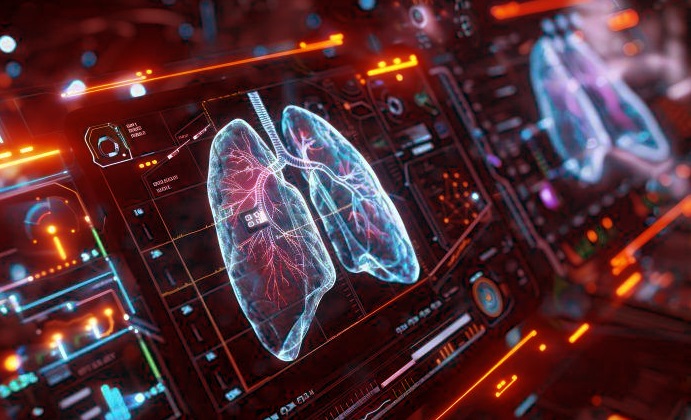Thai Scientists from Khon Kaen Develop AI Platform for Accurate Lung Cancer Detection
Nikhil Prasad Fact checked by:Thailand Medical News Team Feb 12, 2025 2 months, 1 day, 9 minutes ago
Medical News: A Breakthrough in Medical Imaging with AI
In a groundbreaking advancement for lung cancer diagnosis, researchers from Khon Kaen University (KKU) and Rajamangala University of Technology Isan (RMUTI) have developed an artificial intelligence (AI) platform that significantly improves the accuracy of detecting lung cancer through CT scan images. This cutting-edge innovation utilizes deep learning models, specifically the Visual Geometry Group 16 (VGG16) architecture, to classify lung abnormalities with remarkable precision. Given the high mortality rates associated with lung cancer, early and accurate diagnosis plays a crucial role in improving patient survival rates.
 Thai Scientists from Khon Kaen Develop AI Platform for Accurate Lung Cancer Detection
The Importance of Early Lung Cancer Detection
Thai Scientists from Khon Kaen Develop AI Platform for Accurate Lung Cancer Detection
The Importance of Early Lung Cancer Detection
Lung cancer remains one of the deadliest diseases worldwide, surpassing breast, colorectal, and prostate cancers in mortality rates. Many cases are diagnosed in advanced stages due to the lack of noticeable symptoms in the early phases.
Conventional diagnostic methods such as CT scans require highly trained radiologists to differentiate between normal, benign, and malignant lung conditions. However, human error and time constraints often hinder accurate diagnoses.
This
Medical News report highlights how AI-driven diagnostic tools, like the one developed by Thai scientists, can revolutionize early detection efforts by providing a reliable, automated method to analyze medical imaging data with high accuracy. This study aims to address the limitations of traditional diagnostic techniques by incorporating AI to assist medical professionals in making faster and more precise assessments.
The AI Model: VGG16 Outperforms Other Architectures
The research team, led by experts from KKU's Department of Information Science and RMUTI's Department of Information Systems, trained and tested several AI models to evaluate their effectiveness in classifying lung cancer. Among the models tested, VGG16 demonstrated superior performance in distinguishing between three categories of lung CT scans:
-Normal: No abnormalities detected.
-Benign: Non-cancerous lung abnormalities.
-Malignant: Confirmed lung cancer cases.
The study utilized a dataset comprising 1,097 CT scan images from 110 patients. The images were preprocessed, resized to 224×224 pixels, and enhanced through data augmentation techniques to improve the AI model's ability to recognize diverse patterns in lung scans. The dataset was divided into training (70%), validation (20%), and testing (10%) subsets to ensure robust model evaluation.
Key Findings from the Study
The study compared VGG16 with three other popular deep learning architectures - ResNet50, InceptionV3, and MobileNetV2. The results showed that:
-VGG16 achieved the highest accuracy at 98.18%, significantly outperf
orming the other models in classifying lung cancer images.
-MobileNetV2 followed closely, demonstrating balanced efficiency, but exhibited slightly lower accuracy (93.64%).
-ResNet50, known for its deep residual learning approach, maintained stable performance but fell short with an accuracy of 93.33%.
-InceptionV3 recorded the lowest performance, with an accuracy of 88.79%, showing variability in distinguishing between benign and malignant cases.
The study incorporated Gradient-weighted Class Activation Mapping (Grad-CAM) to enhance the explainability of the model’s decisions. By generating heatmaps, Grad-CAM highlighted the areas within CT scans that influenced the model's classifications, allowing radiologists to validate the AI’s decision-making process.
Clinical Implications and Future Enhancements
The research findings confirm that AI-powered models, particularly VGG16, hold immense potential as supportive tools in lung cancer detection. The AI system can assist radiologists by providing an additional layer of accuracy, reducing the chances of misdiagnosis, and accelerating the screening process for suspected lung cancer cases.
Despite the promising results, the researchers identified some limitations, including the relatively small dataset size. They suggested expanding the dataset using larger, more diverse imaging sources and exploring advanced AI techniques such as 3D Convolutional Neural Networks (3D CNN) and Vision Transformers for improved performance. Moreover, integrating AI-driven models into hospital workflows would require regulatory approvals and clinician training to ensure effective adoption in real-world medical settings.
Conclusion
The AI-powered lung cancer detection system developed by Thai researchers marks a significant milestone in the field of medical imaging and artificial intelligence. By leveraging deep learning models like VGG16, the platform offers a high-accuracy, automated method for diagnosing lung cancer, providing critical support to healthcare professionals.
With further refinements, increased dataset diversity, and enhanced interpretability features like Grad-CAM, this AI model could become a standard diagnostic tool in medical facilities worldwide. Ultimately, integrating AI into cancer detection has the potential to save lives by ensuring early diagnosis and timely treatment interventions.
The study findings were published in the peer-reviewed journal: Informatics.
https://www.mdpi.com/2227-9709/12/1/18
For the latest on AI in Medicine, keep on logging to Thailand
Medical News.
Read Also:
https://www.thailandmedical.news/news/using-artificial-intelligence-to-predict-long-covid-outcomes
https://www.thailandmedical.news/news/ai-in-medicine-ai-enhanced-thermal-imaging-revolutionizes-coronary-artery-disease-diagnosis
https://www.thailandmedical.news/news/ai-in-medicine-revolutionizing-colorectal-cancer-screening:-the-impact-of-ai-assisted-colonoscopy-on-adenoma-detection
https://www.thailandmedical.news/articles/ai-in-medicine
